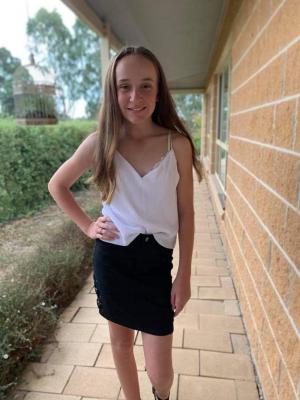By Jessica Anstice
The coronavirus pandemic has placed an additional burden on a 14-year-old girl who has epilepsy.
Berwick teen, Ava Beck, has experienced seizures since she was nine-years-old, although it was some time after her first seizure that she was diagnosed with the condition.
One night at basketball training, the active teen had her first seizure, however Ava’s mum, Lisa Beck, did not realise it was a seizure at the time.
“She was conscious through it. She just said she felt sick, which we now know was an aura, or feeling, that always precludes one of her seizures,” Ms Beck recalled.
“She then went on to have several more seizures over the next week and, one night, we had to take her to the emergency department at the hospital.”
Ava visited a general practitioner and was referred to a paediatrician who prescribed medication and ordered an electroencephalogram (EEG) which is a test used to find problems related to electrical activity of the brain.
Neither solutions worked and Ava was back to square one.
She was then referred to a neurologist who specialises in epilepsy.
The neurologist ordered extensive testing, including a positron emission tomography scan, an MRI and a video EEG at the Royal Children’s Hospital.
After months of sitting in waiting rooms, undergoing tests and trialling medication, Ava was finally diagnosed with focal epilepsy.
“In that first year, Ava was having multiple seizures, which required many trips to hospital and absences from school, and the medication just wasn’t working,” Ms Beck said.
“It took over a year of tests and trialing different medication to find the right medication that was able to stop the prolonged seizures with as few side-effects as possible, so that she could get back to a more ‘normal’ life.”
To add to the Beck family’s stresses of managing Ava’s epilepsy, Covid-19 has presented them with some new challenges.
Before the severity of the pandemic hit, Ava was selected for a new type of scan, called a magnetoencephalography (MEG) scan at Swinburne University as part of a research project.
The scan would hopefully pinpoint the exact part of her brain that is causing her focal seizures, thereby making her a candidate for surgery, Lisa explained.
With all universities closed under Covid-19 restrictions, the test has been postponed, along with her potential for surgery.
Another layer of fear was added to the Beck’s situation when Ava recently experienced an hour-long seizure.
“We called the ambulance but then we decided to refuse to let her go to hospital due to our fear of her being in a hospital emergency environment and the potential to get Covid-19 there,” she said.
“The paramedics were great, they waited another half an hour or so with us until the seizure passed, but it was a very worrying time for us.”
In this year’s Epilepsy Foundation’s Walk for Epilepsy, a virtual fundraising walk will be held from 1 to 25 October in support of the one in 25 Australians who suffer from epilepsy.
Ava and her family will take part in the fundraising initiative, along with her cousin who founded Ava’s Purple Warriors.









